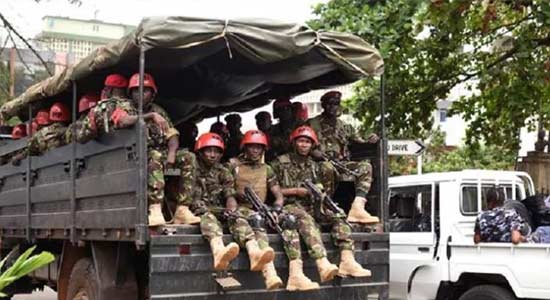
Several senior military officers have been arrested in Sierra Leone, after weeks of political instability following the conclusion of presidential and general elections held on 24th of June 2023.
According to a statement published by the police yesterday, the senior military officers were among several people arrested and detained by the police, suspected of plotting to use a planned public protest next week “to launch violent attacks on state institutions and citizens”.

Stopping short of referring to the alleged attacks as a coup against the government, the police said that: “Preliminary investigations have revealed that these individuals planned to use purported peaceful protests between 7th and 10th August 2023, as a guise to unleash violent attacks against state institutions and peaceful citizens.”
President Bio did not attend last week’s ECOWAS leaders meeting in Abuja, as security around the president and State House remains tense.

Speaking at a press conference held at police headquarters yesterday, the police did not disclose the names of those arrested and the number of officers involved.
But these arrests do not come as a surprise to many political analysts who have been writing about fractured relationships between State House and senior military officers in Sierra Leone, who are deeply concerned about the current political crisis in the country that has been triggered by what international and local election observers have described as “rigged election results” announced by the Electoral Commission..
President Julius Maada Bio was declared winner of the presidential elections at the first round of ballots in June, but the actual disaggregated polling station results have been hidden from the public by the Chief Electoral Commissioner – Mohamed Konneh, prompting accusations of electoral fraud.
The main opposition APC party and the international community are calling for the publication of all polling station results to ensure transparency and to verify the legitimacy of the Bio-led government.
Sierra Leone is regionally and tribally divided, and this polarity runs across all facets of public life – including the military and police, where it is thought that senior officers are deeply dissatisfied with the political impasse caused by the election fallout between the ruling SLPP whose political heartland is in the southeast, and the main opposition APC from the northwest of the country.
The country’s economy is in serious trouble, with inflation running at 49% and youth unemployment increasing year on year with no sign in sight of an effective government response.
Foreign investors are shying away from the country, following President Bio’s recent crackdown on protesters which has seen over one hundred people gunned down in cold blood.
Elected members of parliament, local councillors and mayors representing the main opposition All People’s Congress (APC) party are boycotting all political involvement and engagement with the government, including abstention from the country’s parliament, until all polling station results have been published, or a re-run of the elections is conducted under the leadership of a new chief electoral officer.
With several West African nations including neighbouring Guinea, Mali, Burkina Faso and now Niger under the grip of disgruntled military leaders who justify their intervention with evidence of corruption by the ruling elites, poor governance and growing poverty, countries like Sierra Leone will continue to face political instability and threats of military coups if election crises and question of legitimacy are left unresolved.
Credit: The Nigeria Lawyer
